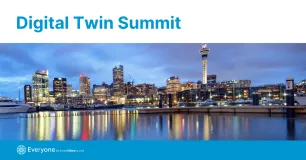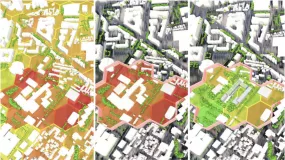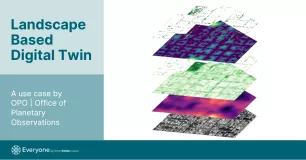
Submitted by Keri Niven, Greg Preston
Purpose
The purpose of this paper is to summarise the outcomes of a workshop held at the Digital Twin Summit in Wellington 7 July 2022. This workshop targeted towards an invited group of people with a particular interest in, or responsibility for, Infrastructure. The facilitators of this group met a second time to play back and summarise key discussion points and themes, which are important to share more broadly across New Zealand – with the key audience for this paper being Te Waihanga, the Construction Sector Accord (MBIE), and the Offices of Minister Clark and Minister Robertson.
Context
New Zealand will face a number of infrastructure challenges over the coming decades. These include:
- Preparing for, and responding to, natural disasters: earthquake, flood, fire, etc.
- Adapting to, and mitigating climate change and other environmental risks
- Optimising the use of current infrastructure including maintenance and renewals of existing infrastructure
- Building new infrastructure to respond to growth and historical under-investment
- Meet the challenges of increased costs, constrained supply chains and significant skills shortages
- Resource constraints, RMA reform and a difficult planning environment.
- Giving effect to Te Tiriti 0 Waitangi principles.
Internationally, multiple Cities, Regions and Nations are adopting Digital Twin Strategies as a mechanism through which a connected, systems approach to sharing data and insights can facilitate improved planning, engagement, and decision making. A common challenge that those seeking to implement Digital Twins report is the need to gain consensus on common standards, processes and data in a way that facilitates “open” participation, within a framework of structure. Lack of co-ordination (or Policy) directive which both requires key asset owners to contribute to a National DT strategy, and helps them understand how to participate is evolving as a common challenge. This discussion formed part of the Digital Twin workshop – namely “should Government mandate a Digital Twin Strategy for New Zealand?” If not, how can key industry players continue to drive collaboration and data sharing, and evolve best practice information and asset management through a “coalition of the willing”.
The workshop panel concluded that a key approach to meeting these challenges is the adoption of a Digital Engineering (DE) approach; whereby information is shared and optimised throughout the whole of life of an asset, and where all parties across the supply chain understand their roles and responsibilities with respect to information and data ownership.
One possible outcome of the smart use of DE is the widespread development of digital twins, which in turn, will evolve over time to help industry understand, plan, manage and communicate complicated infrastructure issues.
Key points
- New Zealand is well behind other jurisdictions in leveraging the benefits of DE and Digital Twins for Infrastructure. However, this does mean that there are many valuable lessons that we can adapt from overseas.
- There is no clearly articulated New Zealand-wide strategy for DE and there is no single organisation that is currently capable of coordinating and implementing such a strategy.
- The Infrastructure Commission’s recent strategy does identify the important role of digital and data driven solutions
- Infrastructure and digital solutions need to incorporate mana whenua worldview
- Pace and scale of infrastructure construction projects cannot be delivered by current supply chain approach
- Coordination is key. At its heart, DE is a process of collaboration and an Digital Twin is a collaborative tool for planning, managing and communicating.
- Procurement, legal, cultural, commercial aspects are more important than technology selection at the project level
- There is a desire for “best for project” collaboration on projects by Asset Owners – however contracts in common use and procurement processes do not support this. Also, best for project’ may not translate to “best for system”, meaning that the digital aspects of a project may not conform to standards that allow good integration with national systems. Projects are not co-ordinated across the country with a common view on a best-for-community approach.
- ISO19650 is becoming prevalent in its use across major projects
- Progress is largely being driven by a coalition of the willing – key asset owners and supply chain leaders – lack of progress (standards, support, alignment, funding) at a national scale which will dilute the willingness to collaborate over time.
- Political environment, short election cyclescan have very serious negative influence on major projects and reform (health, water, etc.)
- Lessons may not have been learnt from prvious NZ experience, i.e., SCIRT NCTIR.
Call to action
There is an urgent need for an organisation to lead the DE/Digital Twin space in NZ. This should be a collaboration of Central Government, Local Government, Iwi, Engineering Lifeline Utilities, Asset Owners, Consultants, Contractors, Academia, etc. Sponsorship and Leadership needs to come from the highest levels in all these areas.
The Construction Sector Transformation Plan 2022-2025 has been released and is tasked with modernising the sector through a data-driven and collaborative approach. Digitisation, and standardisation of approach is key to success.
A DE approach offers tremendous opportunities to enable transformation in the construction sector – through supply chain empowerment which fosters innovation and drives efficiencies, and through data-driven decision making across a full asset lifecycle
There is a need to develop clarity and “plain language” in New Zealand regarding digital engineering, digital twins and digitisation activities. There is the opportunity to adopt learnings from the Centre for Digital Built Britain, and to leverage established resources such as the Gemini Principles, which are key to developing a National view of what “good” looks like for DE and Asset Information.
Industry players are currently collaborating through a “coalition of the willing”. This goodwill (as articulated and experienced by the Centre For Digital Built Britain upon its closure) will not last forever – we have the opportunity to leverage current knowledge now
We need to identify that the benefits are pan-organisational and that tying the broader benefits to individual projects is short sighted and ignores the broader picture for NZ Inc



